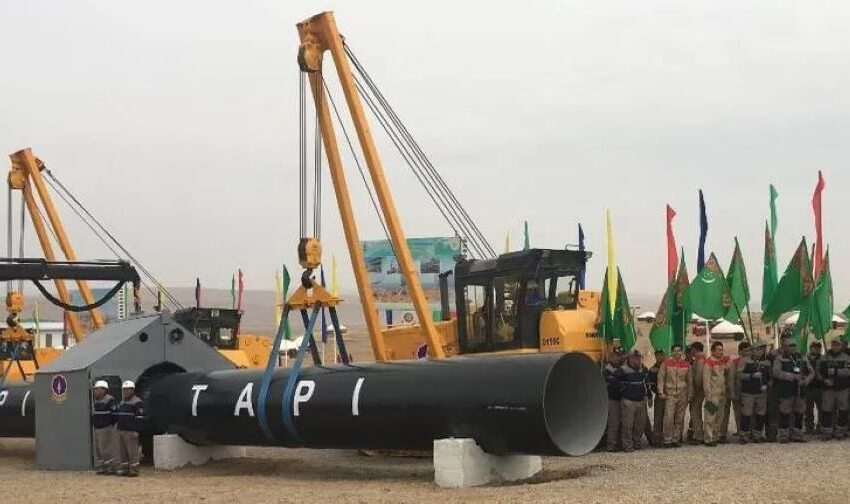
Turkmenistan and Afghanistan Resume Work On TAPI Project
Work of the much-delayed $10 billion Turkmenistan–Afghanistan–Pakistan–India (TAPI) Gas Pipeline project resumed with senior Afghanistan officials visiting Herat province in the land-locked country on Wednesday.
Simultaneously on the Turkmenistan side, Turkmenistan President Serdar Berdimuhamedov and his officials along with acting chairman of the Afghanistan’s Cabinet Molla Mohammed Hassan Akhund and other representatives witnessed the opening of a 177-meter railway bridge of the Serhetabat-Turgundi steel highway besides laying foundation for the Şatlyk-1 gas compressor station in the Mary velayat.
As much as 33 billion cubic meters of natural gas can be transported through TAPI pipeline per year from Galkynysh Gas Field in Turkmenistan alongside the Kandahar–Herat Highway in western Afghanistan, Quetta and Multan in Pakistan and the final destination of the pipeline will be the Indian town of Fazilka, benefiting the entire region economically.
According to the Afghanistan’s Ministry of Foreign Affairs, the implementation of the TAPI project will provide Afghanistan with nearly $450 million annually in transit fees.
Construction on the project started in Turkmenistan on 13 December 2015, while construction of the Afghanistan-Pakistan section of the pipeline was held in February 2018. Proponents of the project see it as a modern continuation of the Silk Road.
In August 2024, Turkmenistan’s Foreign Minister Raşit Meredow virtually met with Afghanistan’s Deputy Prime Minister for Economic Affairs Mullah Abdul Ghani Baradar and Meredow said that his country was ready to begin work on the TAPI project in Afghanistan with the aim of developing political and economic relations.
Leaders from Turkmenistan, Afghanistan, and Pakistan signed the pipeline deal in December 2002, and the ADB’s feasibility study was completed in 2005. The project even received support from the US, as it was the best way for Central Asia to export energy to Western markets without depending on Russian routes.
TAPI project, a significant economic venture for Afghanistan and the region, will provide an opportunity for Afghanistan to create jobs and generate revenue while enhancing its political and economic relations with regional and global partners. It also promises to bolster Afghanistan’s economy and international standing, showcase its capability to manage large-scale initiatives and foster regional cooperation.
Dream Come True
Zabihullah Mujahid, chief spokesman for the Islamic Emirate of Afghanistan (IEA), said that the project was the realisation of a dream 30 years in the making. TAPI gas pipeline project signified prosperity and economic development for Afghanistan and the region at large, he said.
The Afghanistan Chamber of Commerce and Investment (ACCI) also views the implementation of the project as crucial for enhancing Afghanistan’s political and economic relations with regional countries.
ACCI board member Khan Jan Alokozay said: “We hope that there will be no further delays and that the project will start. The importance of this project is immense. With the start of this new work, we believe that a significant change will come to our economy.”
One media report, citing Shakir Yaqoubi, an economic expert, said that with the implementation of the TAPI project, Afghanistan gains access to sufficient gas resources. It will also enhance large-scale economic cooperation and interactions between Afghanistan and regional countries, boost Afghanistan’s transit position more than ever, and secure a favorable and prominent place for Afghanistan in the new economic order.
















